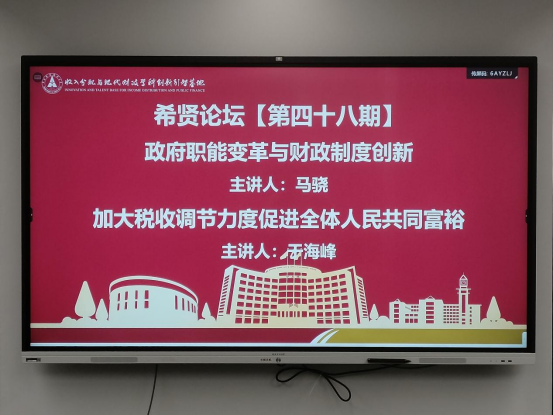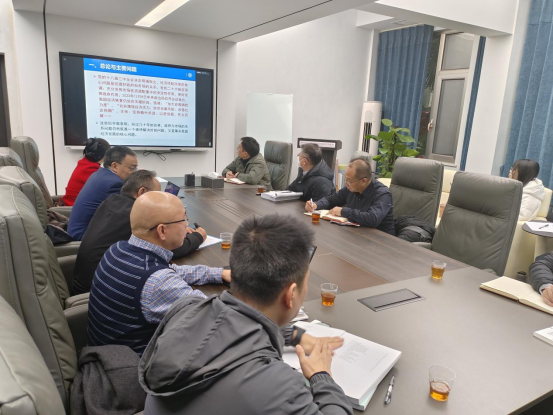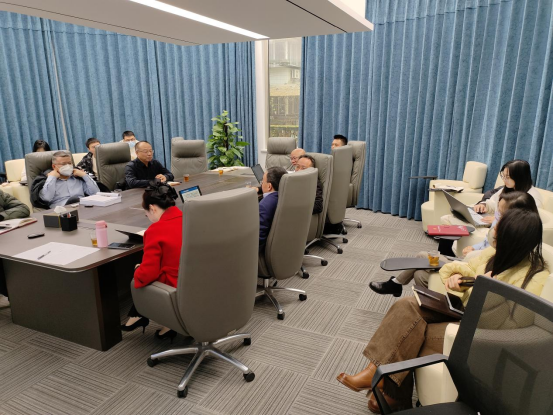The 48th Xi Xian Forum, co-hosted by IIDPF and the School of Public Finance and Taxation, was successfully held on 11 December 2023 in Room 119 of Wenqin Building. Professor Ma Xiao, the former Deputy Secretary of the Party Committee of Southwest University of Finance and Economics, and Professor Yu Haifeng, the President of Guangdong University of Finance and Economics, as the guest speakers of the forum, gave a keynote speech entitled“Changes in Government Functions and Innovations in the Fiscal System” and a keynote speech entitled “Increasing Tax Regulation to Promote the Common Prosperity of All People” respectively. The academic forum was hosted by Professor Sun Qunli, the Deputy Director of IIDPF, with the participation of Professor Zhang Kezhong, the Dean of the School of Public Finance and Taxation and the Deputy Director of IIDPF, Professor Lu Yuanping, the Executive Director of IIDPF and over twenty faculty members and students, including researchers Professor Ke Ling, Associate Professor Wan Xin, Associate Professor Liu Erpeng, Dr Gao Sihan, Dr Wan Qian, and Dr Zou Wei from IIDPF.

Even though the reform of government and market has a history of several decades, the existing economic theories and academic researches have not provided a clear explanation of the relationship between government and market. Professor Ma Xiao, starting from Chinese history, “All land under the sky belongs to the emperor”, elaborated that the government has played an important role in social evolution since ancient times. Government expenditure is an important indicator of government functions, but due to China's developmental characteristics, its share of GDP is low compared to that of European and American countries. Therefore, there are two key questions in the study of government and market – “what factors determine the relationship between government and market" and "what should the government do in modern society”. Based on the economic theories both at home and abroad, Professor Ma Xiao explained that the progress of productivity and the change of social trends are the main forces driving the change of government functions. Finally, Professor Ma, taking into account the development characteristics of modern society, clarified that future government functions need to take into account factors such as economic globalisation, science and technology, social governance innovation, etc., and that future fiscal systems need to effectively perform government functions, formulate a basic fiscal law under the framework of the Constitution, improve the system of national governance, and set up a good relationship between the government and the market in the modern society.

Common prosperity is one of the basic features of Chinese-style modernisation and an important goal for achieving the great rejuvenation of the Chinese nation. Professor Yu Haifeng discussed the important role of tax regulation in common prosperity from the perspective of taxation. Professor Yu Haifeng first traced the history of China's tax policy, explained the meaning of China's tax policy with vivid stories, and elaborated on the important role of all kinds of taxes in the common prosperity. In the past ten years of the new era, tax has played an important role in promoting common prosperity, and the tax reduction policy and the reform of transfer tax have laid a solid foundation for common prosperity. Professor Yu Haifeng focused on income taxes, particularly personal income tax, as a key tool for adjusting income disparities and fostering shared prosperity, highlighting that the share of personal income tax in China's tax system remains significantly low. In addition, Professor Yu pointed out that the current tax regulation in the field of property tax is actually regressive. Therefore, in view of the characteristics of China's taxation, Prof. Yu proposed that the future role of taxation in promoting common prosperity can be regulated in the following directions: firstly, in the first distribution, VAT should be the main regulating carrier, deepen the VAT reform, and reduce the proportion of indirect tax. Secondly, in the redistribution, personal income tax should be used as the main regulating carrier, and the proportion of the labour remuneration should be increased, so as to encourage hardworking to become rich. Finally, in the third redistribution segment, it is necessary to focus on the coordinating role of income tax and VAT, and actively guide enterprises, social organisations and individuals to participate in public welfare undertakings.

Professor Ma Xiao and Professor Yu Haifeng gave a wonderful speech to the faculty and students present and at the same time triggered their in-depth thinking. In the discussion session, the attending faculty and students actively interacted regarding the theoretical foundations and characteristics of China's fiscal and tax system. Assistant Professor Ma Xiao and Professor Yu Haifeng's sharing promoted the communication between different academic viewpoints and created a strong academic atmosphere.
